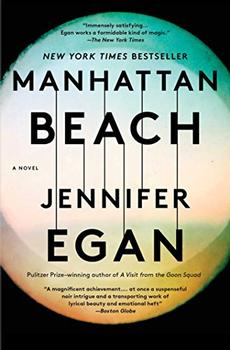Summary | Excerpt | Reading Guide | Reviews | Beyond the Book | Readalikes | Genres & Themes | Author Bio

"You realize that the Nazis have Stalingrad surrounded."
She nodded, head bowed in humiliation.
"And that the Japs control the Pacific theater from the Philippines to New Guinea?"
"Yes."
"You understand that the work we do here, building and repairing Allied ships, is what allows sailors, airplanes, bombs, and convoy escorts to reach the field of battle?"
A filament of annoyance waggled inside her. He'd made his point. "Yes."
"And that hundreds of Allied merchantmen have been torpedoed since the war began, with more going down each day?"
"We're losing fewer ships than before, and building more," she said quietly, having read this in the Times just recently. "Kaiser shipyard built a Liberty ship in ten days last month."
It sounded egregiously fresh, and Anna waited for the blow to fall. But Mr. Voss merely said after a pause, "I notice you don't bring a lunch. I presume you live at home?"
"Yes, I do," Anna said. "But my mother and I are awfully busy caring for my sister. She's badly crippled."
This was true. But also untrue. Her mother made breakfast and dinner for Anna; she easily could have packed a lunch, and had offered to. Anna had slipped into the unguarded manner she often found herself assuming with strangers, or virtual strangers. Her reward was a faint disturbance of surprise in Mr. Voss's face.
"Now, that's a shame," he said. "Can't your father help?"
"He's gone." She almost never revealed this fact, and hadn't planned to.
"In the service?" He looked dubious; surely a man with a nineteen-year-old daughter would be too old.
"Just—gone."
"He abandoned your family?"
"Five years ago."
Had Anna felt any emotion at this disclosure, she would have concealed it. But she did not. Her father had left the apartment as he would have on any day—she couldn't even recall it. The truth had arrived gradually, like nightfall: a recognition, when she caught herself awaiting his return, that she'd waited days, then weeks, then months—and he'd still not come. She was fourteen, then fifteen. Hope became the memory of hope: a numb, dead patch. She no longer could picture him clearly.
Mr. Voss took a long breath. "Well, that is difficult," he said. "Very difficult for you and your mother."
"And my sister," she said reflexively.
The silence that opened around them was uncomfortable but not unpleasant. It was a change. Mr. Voss's shirtsleeves were rolled; she noticed the blond hairs on his hands and strong rectangular wrists. Anna sensed his sympathy, but the tight aperture of their discourse afforded no channel through which sentiment might flow. And sympathy was not what she wanted. She wanted to go out at lunchtime.
The bustle of the shift change had settled; the night inspectors must be at work on their trays. Anna found herself recalling the girl on the bicycle. Nell—the name came to her suddenly, from the newspaper caption.
"Miss Kerrigan," Mr. Voss said at last. "You may go out for lunch, if you will carefully mind the time and work to your full capacity."
"Thank you," Anna cried, leaping to her feet. Mr. Voss looked startled, then stood as well. He smiled, something she hadn't seen before. It changed him, that smile, as if all the severity he displayed on the inspection floor were a hiding place from which this amiable man had just waved hello. Only his voice was the same.
"I expect your mother will be needing you at home," he said. "Good evening."
Excerpted from Manhattan Beach by Jennifer Egan. Copyright © 2017 by Jennifer Egan. Excerpted by permission of Scribner. All rights reserved. No part of this excerpt may be reproduced or reprinted without permission in writing from the publisher.
It was one of the worst speeches I ever heard ... when a simple apology was all that was required.
Click Here to find out who said this, as well as discovering other famous literary quotes!
Your guide toexceptional books
BookBrowse seeks out and recommends the best in contemporary fiction and nonfiction—books that not only engage and entertain but also deepen our understanding of ourselves and the world around us.